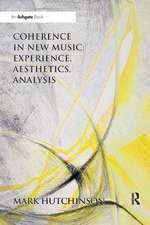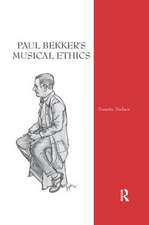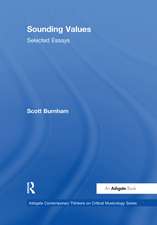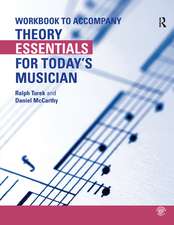Towards a Twenty-First-Century Feminist Politics of Music
Autor Sally Macarthuren Limba Engleză Paperback – 19 oct 2016
| Toate formatele și edițiile | Preț | Express |
|---|---|---|
| Paperback (1) | 489.26 lei 6-8 săpt. | |
| Taylor & Francis – 19 oct 2016 | 489.26 lei 6-8 săpt. | |
| Hardback (1) | 1112.34 lei 6-8 săpt. | |
| Taylor & Francis – 28 dec 2010 | 1112.34 lei 6-8 săpt. |
Preț: 489.26 lei
Nou
Puncte Express: 734
Preț estimativ în valută:
93.62€ • 97.99$ • 77.92£
93.62€ • 97.99$ • 77.92£
Carte tipărită la comandă
Livrare economică 31 martie-14 aprilie
Preluare comenzi: 021 569.72.76
Specificații
ISBN-13: 9781138274723
ISBN-10: 1138274720
Pagini: 206
Dimensiuni: 156 x 234 x 11 mm
Greutate: 0.45 kg
Ediția:1
Editura: Taylor & Francis
Colecția Routledge
Locul publicării:Oxford, United Kingdom
ISBN-10: 1138274720
Pagini: 206
Dimensiuni: 156 x 234 x 11 mm
Greutate: 0.45 kg
Ediția:1
Editura: Taylor & Francis
Colecția Routledge
Locul publicării:Oxford, United Kingdom
Cuprins
Contents: Introduction: thinking with Deleuze; How is gender composed in musical composition?; How is the composer composed?; Composing 'new' music's public image; Feminists recomposing the field of musicology; A thousand dissonances and women's 'new' music; Women, 'new' music and the composition of becomings; Bibliography; Index.
Notă biografică
Dr Sally Macarthur, Senior Lecturer in Musicology, School of Communication Arts, University of Western Sydney, Australia
Recenzii
’Sally Macarthur’s current, ground-breaking research provides a timely, renewed approach to addressing an ongoing ’problem’-namely, feminism and (art-)music. Her work goes a substantial way towards filling the gap that has occurred in this first decade of the twenty-first century, both in research on women’s music and also in the best ways into that research-ways that transcend the cul-de-sac in which traditional feminist musicological models have resulted.’ Linda Kouvaras, University of Melbourne, Australia ’This book makes a significant contribution to the field of contemporary music. It is innovative, challenging and highly readable. Its major contribution is to open up a new way of thinking about the absence of women’s music in the concert halls. It does not aim for a quantitative solution where numbers of women composers equals that of men, but to discover new potentialities, new possibilities for thought and action. It is a moving and important conceptual study that has the potential to make a difference.’ Bronwyn Davies, University of Melbourne, Australia '... the book is provocative and sure to stimulate lively discussions and future scholarship... Highly recommended.' Choice '... a stimulating read and much food for thought... Sally Macarthur’s committed foray into post-second wave feminist politics has the potential to spark other studies of the current landscape, a welcome prospect for the field. It also brings a new subjective position to the scholarly discourse on women and music, one that resides outside the dominant US-UK-Germany fold.' Music and Letters 'This is the kind of book that stays with you long after you’ve finished reading it... Breaking free from the tired and worn out stories of women’s underrepresentation in music, it challenges readers to look at this ’problem’ differently, and imagine a future beyond the status quo.' Music Forum ’... a powerfully political book that is distinct from previous stu
Descriere
Towards a Twenty-First Century Feminist Politics of Music opens up a new way of thinking about the absence of women's music. It does not aim to find 'a solution' in a liberal feminist sense, but to discover new potentialities, new possibilities for thought and action. Sally Macarthur encourages us, with the assistance of Deleuze, and feminist-Deleuzian work, to begin the important work of imagining what else might be possible, not in order to provide answers but to open up the as yet unknown. The power of thought - or what Deleuze calls the 'virtual' - opens up new possibilities. Macarthur suggests that the future for women's 'new' music is not tied to the predictable and known but to futures beyond the already-known. Previous research concludes that women's music is virtually absent from the concert hall, and yet fails to find a way of changing this situation. Macarthur finds that the flaw in the recommendations flowing from past research is that it envisages the future from the standpoint of the present, and it relies on a set of pre-determined goals. It thus replicates the present reality, so reinforcing rather than changing the status quo. Macarthur challenges this thinking, and argues that this repetitive way of thinking is stuck in the present, unable to move forward. This book sets out to develop a new conception of subjectivity that sows the seeds of a twenty-first century affirmative, feminist politics of music.























